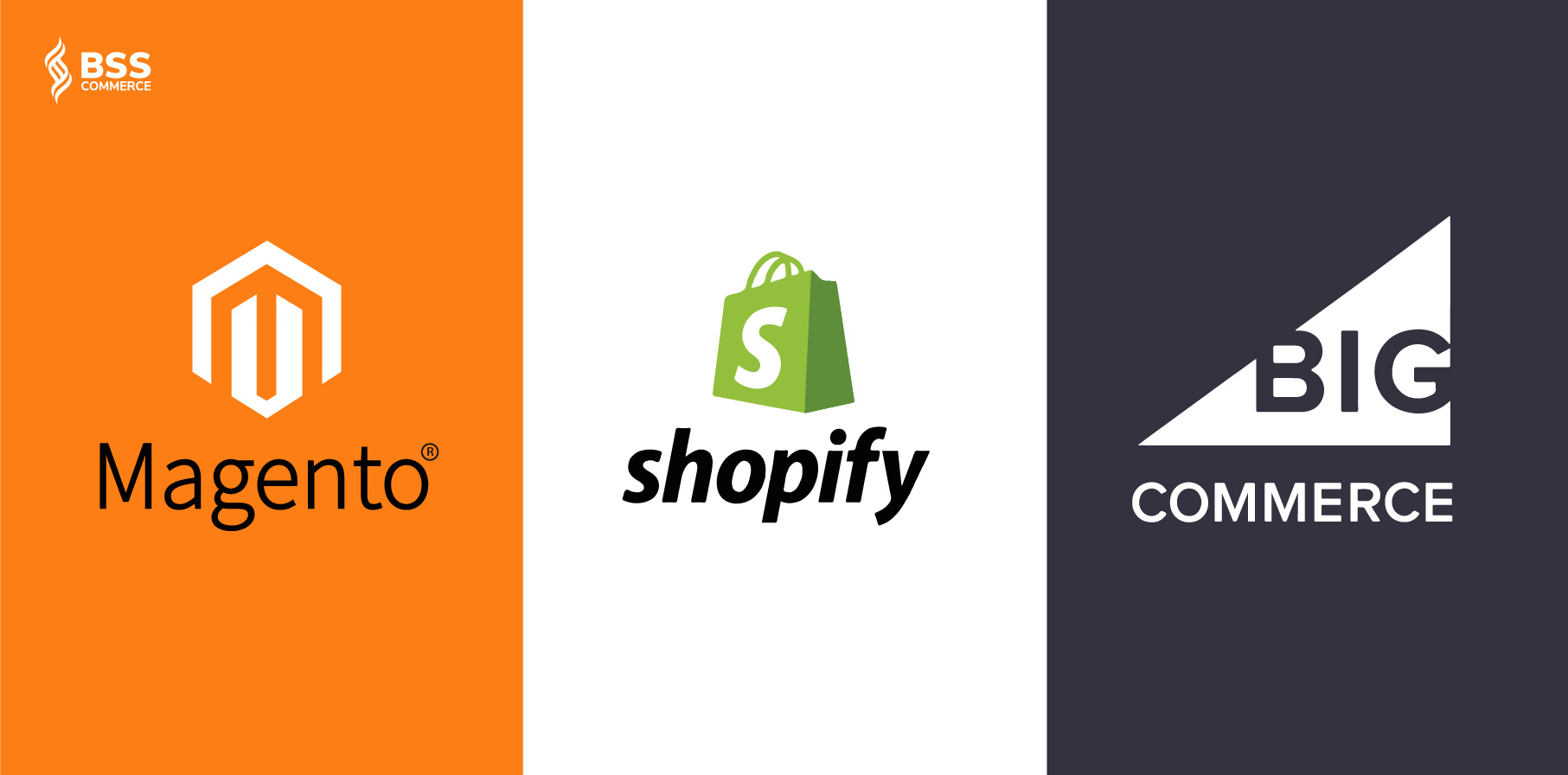Selecting the best-fit B2B eCommerce platform has always been a tough task requiring merchants to put much thought, deep research and careful planning. This hardship multiplies when you intend to build a B2B website. Yet, your confusion will be cleared away now by our comparison article of 3 giants: Magento vs Shopify vs BigCommerce.
This resource compares Magento vs BigCommerce vs Shopify through main criteria including B2B features, pricing, time-to-market, and many more.
I – Introduction to Magento vs Shopify vs BigCommerce
Table of Contents
The first section provides an overview of Magento vs Shopify vs BigCommerce related to their identity, their main strengths and weaknesses.
Their Race to Fit B2B eCommerce Community
Shopify vs Magento vs BigCommerce History
Magento
Launched in 2007 as a replacement for a popular platform called osC Commerce, Magento had quickly gained popularity.

Magento shifted from targeting all online business sizes to focusing on medium-to-large ones at the enterprise level. Mentioning B2B eCommerce, Magento always tops the chart thanks to its superior power in building a complete B2B site.
Magento Commerce offers essential features for both small and large B2B businesses, which covers every walk of a typical B2B buying journey.
And even when you use Magento Open Source, which doesn’t include B2B features available for free, there are still dozens of Magento 2 B2B extensions out there waiting for you to choose. Installing quality tools on your site helps smooth transactions between merchants and corporate customers and protects your budget significantly.
You plan to hire a web development agency majoring in B2B, don’t you?
JUMP INTO B2B web development NOW to build an online store full of B2B insights!
Shopify
Unlike its counterpart, Shopify’s history is quite simple. Founded in 2004, the company has grown to be the most recognized eCommerce platform for small eCommerce businesses.

Shopify majors in the low end of the market, bringing simplicity to small retailers. Shopify Plus was launched in 2014 as a white glove solution. At that time, Shopify claimed that their SME’s core solution would remain the primary. Shopify Plus’ prices have recently gone up, and they aim to strike bigger businesses.
Nevertheless, in the current B2B race, regarding the comprehensiveness of an eCommerce B2B solution, Shopify Plus is still lagging due to its lack of must-have functions by default. You will need to find help from external apps.
BigCommerce
Despite being born after the two competitors above, BigCommerce, an easy-to-use platform, is advancing dramatically with various out-of-the-box solutions.

Dissimilar to Magento, which gives almost all authority to its users, BigCommerce doesn’t require merchants to have an in-house development team; instead, they keep everything from hosting to infrastructure maintenance under their control.
Moreover, BigCommerce offers the Enterprise option serving B2B segments. Frankly, this just covers the purchase flow of a typical corporate buyer partly. To fully meet business demands, you need to integrate BundleB2B from the third-party provider. Features like product reviews, digital marketing, and loyalty programs are their strengths.
In brief, Magento vs Shopify vs BigCommerce originally started their entry into the B2C market; however, soon after that, they hit the B2B market by launching premium versions to win the pie in this market.
Current B2B Performance
This section discloses the current performance and position in the market of Shopify vs Magento vs BigCommerce.
II – Magento vs Shopify Plus vs BigCommerce: Comparison Criteria for B2B Platforms
Must-have B2B Capabilities to Serve Online Corporate Customers
No matter which platform you pick, you should bear in mind indispensable features for sustainable B2B website development.
Magento vs Shopify vs BigCommerce Comparison Chart
We compare the 3 common platforms based on their B2B capabilities, other features, software updates, scalability, customizability, time to market, community size, number of extensions/ add-ons, and more
III – How They Look
Here, we show some storefront and backend images of each platform – Shopify vs Magento vs BigCommerce – so you can visualize them.
IV – Magento vs Shopify Plus vs BigCommerce – Which Suits Your B2B eCommerce Store?
We’ve arrived at the final part of this weighing battle. Hopefully, you’ve answered the question: “What is the best B2B platform for my business?”. As mentioned before, each has its own pros and cons; the best advice is to consider your financial status, business goals/ visions, annual revenue, product line, and customization needs to pick the best fit.
To see a full version of our Shopify vs Magento vs BigCommerce comparison article, please fill in the form below and the most detailed resource will be delivered to your email in the blink of an eye!
Conclusion
In brief, you get a say in customizing and managing your B2B website when using Magento; however, you will also have a greater responsibility than those using Shopify or BigCommerce. With Magento, you can’t handle it yourself; it’s a must to hire a developer team to build, go live, maintain, and support your eCommerce store.
Bear in mind that freedom means more responsibility and more robust experiences; in return, lack of freedom restricts tons of needed features but is safer and easier to use.
BSS Commerce is one of the leading Magento modules/ Shopify app providers and multi-platform B2B web development services in the world. With experienced and certified Magento and Shopify developers, we commit to bring high-quality products and services to optimize our business effectively. Contact us now to let us know your problems. We are willing to support you every time!
